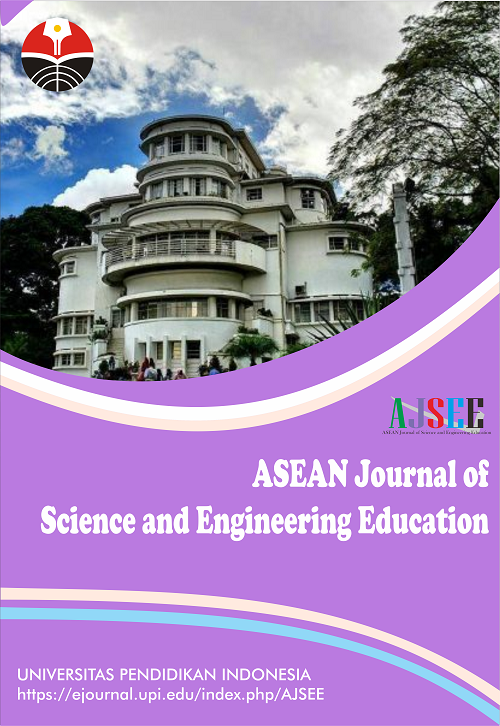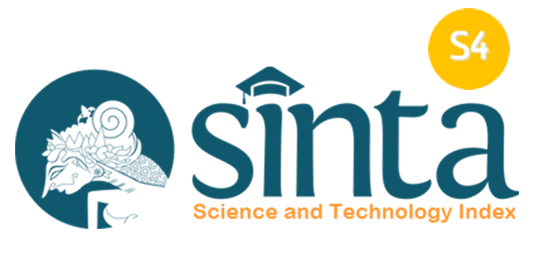Primary Teachers’ Mathematics Anxiety and Mathematics Teaching Anxiety as Predictors of Students’ Performance in Mathematics
Abstract
Keywords
Full Text:
PDFReferences
Aiken, L. R. (1970). Attitudes toward mathematics. Review of Educational Research, 40(4), 551-596.
Akinsola, M. K. (2002). In-service elementary teachers’ mathematics anxiety and its relationship to teachers’ attitude towards the studying and teaching of mathematics. Nigerian Journal of Applied Psychology, 7(1), 188-202.
Akinsola, M. K. (2008). Relationship of some psychological variables in predicting problem solving ability of in-service mathematics teachers. The Montana Mathematics Enthusiasts, 5(1), 79-100.
Ameen, E. C., Guffey, D. M., and Jackson, C. (2002). Evidence of teaching anxiety among accounting educators. Journal of Education for Business, 78(1), 16–22.
Artemenko, C., Daroczy, G., and Nuerk, H. C. (2015) Neural correlates of math anxiety – an overview and implications. Frontiers in Psychology, 6, 1-8.
Ashcraft, M. H., and Krause, J. A. (2007). Working memory, math performance, and math anxiety. Psychonomic Bulletin & Review, 14(2), 243-248.
Aslan, D., Oğul, I. G., and Taş, I. (2013). The impacts of preschool teachers' mathematics anxiety and beliefs on children's mathematics achievement. International Journal of Humanities and Social Science Invention, 2(7), 45-49.
Awofala, A. O. A. (2006). The acquisition of mathematical literacy by Nigerian students in the mathematics curriculum of 6-3-3-4 system of education. African Journal of Historical Sciences in Education, 1(2), 135- 153
Awofala, A. O. A. (2008a). Women and the learning of mathematics. African Journal of Historical Sciences in Education, 2(1), 195–213.
Awofala, A. O. A. (2008b). Sex, Blood type and the relationship between mathematics self-efficacy and achievement in senior secondary school. African Journal of Historical Sciences in Education, 2(2), 94 – 104
Awofala, A. O. A. (2011). Is gender a factor in mathematics performance among Nigerian senior secondary students with varying school organization and location?. International Journal of Mathematics Trends and Technology, 2(3), 17-21.
Awofala, A. O. A. (2012). An analysis of the new 9-year basic education mathematics curriculum in Nigeria. Acta Didactica Napocensia, 5(1), 18 – 28.
Awofala, A. O. A. (2017a). Effect of personalisation of instruction on students’ anxiety in mathematical word problems in Nigeria. Bulgarian Journal of Science and Education Policy, 11(1), 83-120.
Awofala, A. O. A. (2017b). Assessing senior secondary school students’ mathematical proficiency as related to gender and performance in mathematics in Nigeria. International Journal of Research in Education and Science, 3(2), 488-502.
Awofala, A. O. A. (2019). Correlates of senior secondary school students’ mathematics achievement. Educatia 21 Journal, 17, 15-25.
Awofala, A. O. A. (2021). A validation of the mathematical resilience scale for twelfth graders through confirmatory factor analysis and its relationship with achievement in mathematics in Nigeria. SN Social Sciences, 1(8), 1-17.
Awofala, A. O. A., and Akinoso, S. O. (2017). Assessment of psychometric properties of mathematics anxiety questionnaire by preservice teachers in south-west, Nigeria. ABACUS: The Journal of the Mathematical Association of Nigeria, 42(1), 355-369.
Awofala, A. O. A., and Awolola, S. A (2011a). The effect of self-efficacy, anxiety, attitude, and previous mathematics achievement on senior secondary students’ performance in mathematics. African Journal of Historical Sciences in Education, 7(2), 198 – 209.
Awofala, A. O. A., and Falolu, O. S. (2017). Motivation to learn mathematics as correlates of pre-service teachers’ performance in mathematics. ABACUS: The Journal of the Mathematical Association of Nigeria, 42(1), 370-390.
Awofala, A. O. A., and Fatade, A. O. (2015). Validation of the domains of creativity scale for Nigerian preservice science, technology, and mathematics teachers. Electronic Journal of Research in Educational Psychology, 13(1), 131-150.
Awofala, A. O. A., and Lawani, A. O. (2020). Examining the efficacy of co-operative learning strategy on undergraduate students’ achievement in mathematics. International Journal of Pedagogy and Teacher Education, 4(1), 59-82.
Awofala, A. O. A., and Odogwu, H. N. (2017). Assessing preservice teachers’ mathematics cognitive failures as related to mathematics anxiety and performance in undergraduate calculus. Acta Didactica Napocensia, 10(2), 81 – 97.
Awofala, A. O. A., and Sopekan, O. S. (2020). Early-years future teachers’ mathematical beliefs as determinants of performance in primary mathematics. JRAMathEdu (Journal of Research and Advances in Mathematics Education), 5(1), 54-68.
Awofala, A. O. A., Lawani, A. O., and Adeyemi, O. A. (2020). Motivation to learning mathematics and gender as correlates of senior secondary school students’ performance in mathematics. Journal of Educational Sciences, 4(2), 318-333.
Awofala, A. O. A., Olabiyi, O. S., Ojo, O. T., Oladipo, A. J., Fatade, A. O., and Udeani, U. N. (2023). Personal and contextual factors as correlates of entrepreneurial intentions among pre-service science, technology, and mathematics teachers. ASEAN Journal of Science and Engineering Education, 3(3), 265-278.
Awofala, A. O. A., Ola-Oluwa, S. A., and Fatade, A. O., (2012). Teachers’ perception of the new nine-year basic education mathematics curriculum in Nigeria. International Journal of Mathematics Trends and Technology, 3(1), 1 – 6.
Awofala, A. O., Lawal, R. F., Arigbabu, A. A., and Fatade, A. O. (2022). Mathematics productive disposition as a correlate of senior secondary school students’ achievement in mathematics in Nigeria. International Journal of Mathematical Education in Science and Technology, 53(6), 1326-1342.
Battista, M. (1986). The relationship of mathematics anxiety and mathematical knowledge to the learning of mathematical pedagogy by pre-service elementary teachers. School Science and Mathematics, 86(1), 10–19.
Beilock, S. L., Gunderson, E. A., Ramirez, G., and Levine, S. C. (2010). Female teachers’ math anxiety affects girls’ math achievement. Proceedings of the National Academy of Sciences, 107(5), 1860-1863.
Bibby, T. (2002). Shame: An emotional response to doing mathematics as an adult and a teacher. British Educational Research Journal, 28(5), 705–721.
Blazer, C. (2011). Strategies for reducing math anxiety. Information capsule. Research Services, Miami-Dade County Public Schools, 1102, 1-8.
Brown, A. B., Westenskow, A., and Moyer-Packenham, P. S. (2011). Elementary pre-service teachers: Can they experience mathematics teaching anxiety without having mathematics anxiety?. Issues in the Undergraduate Mathematics Preparation of School Teachers (IUMPST): The Journal, 5, 1-14
Bursal, M., and Paznokas, L. (2006). Mathematics anxiety and preservice elementary teachers’ confidence to teach mathematics and science. School Science and Mathematics, 104(6), 173-180.
Chavez, A., and Widmer, C. C. (1982). Math anxiety: Elementary teachers speak for themselves. Educational Leadership, 39(2), 387-388.
Fatade, A. O., Nneji, L. M., Awofala, A. O. A., and Awofala, A. A. (2012). Mode of entry and gender as determinants of Nigerian pre-service teachers’ performance in degree mathematics and science courses. International Journal of Mathematics Trends and Technology, 3(3), 103-109.
Freiberg, M. (2005). Math – that four-letter word!. Academic Exchange Quarterly, 9(3), 7-11.
Furner, J. M., and Berman, B. T. (2004). Confidence in their ability to do mathematics: The need to eradicate math anxiety so our future students can successfully compete in a high-tech globally competitive world. Philosophy of Mathematics Education Journal, 18(1), 1-33.
Gardner, L. and Leak, G. (1994). Characteristics and correlates of teaching anxiety among college psychology teachers. Teaching of Psychology, 21(1), 28-32.
Geist, E. (2010). The anti-anxiety curriculum: Combating math anxiety in the classroom. Journal of Instructional Psychology, 37(1), 24-31.
Gierl, M., and Bisanz, J. (1995). Anxieties and attitudes related to mathematics in grades 3 and 6. The Journal of Experimental Education, 63(2), 139-58.
Goldberg, R., and Waxman, J. (2003). A novel approach to curing quantiphobia. Mathematics and Computer Education, 37(1), 39-54.
Gresham, G. (2007). A study of mathematic anxiety in pre-service teachers. Early Childhood Education Journal, 35(2), 181-188.
Gresham, G. (2009). Examining the relationship between pre-service elementary teachers’ experience of mathematics anxiety and their efficacy for teaching mathematics. Journal of Classroom Interaction, 44(2), 22–38.
Haciomeroglu, G. (2013). Mathematics anxiety and mathematical beliefs: What is the relationship in elementary preservice teachers?. Issues in the Undergraduate Mathematics Preparation of School Teachers (IUMPST): The Journal, 5, 1-9.
Hadley, K. M., and Dorward, J. (2011). The relationship among elementary teachers’ mathematics anxiety, mathematics instructional practices, and student mathematics achievement. Journal of Curriculum and Instruction (JoCI), 5(2), 27-44.
Harper, N., and Daane, C. (1998). Causes and reductions of math anxiety in pre-service elementary teachers. Action in Teacher Education, 19(4), 29–38.
Hembree, R. (1990). The nature, effect, and relief of mathematics anxiety. Journal for Research in Mathematics Education, 21(1), 33-46.
Hilton, P. (1980). Math anxiety: Some suggested causes and cures: Part 1. The Two-Year Mathematics Journal, 11(3), 174-188.
Ho, H., Senturk, D., Lam, A. G., Zimmer, J. M., Hong, S., Okamoto, Y., Chiu, S., Nakazawa, Y., and Peng, C. (2000). The affective and cognitive dimensions of math anxiety: A cross national study. Journal for Research in Mathematics Education, 31(3), 362–379.
Jackson, E. (2008). Mathematics anxiety in student teachers. Practitioner Research in Higher Education, 2(1), 36-42.
Legg, A.M., and Locker, L. (2009). Math performance and its relationship to math anxiety and metacognition. North American Journal of Psychology, 11(3), 471-485.
Malinsky, M., Ross, A., Pannells, T., and McJunkin, M. (2006). Math anxiety in pre-service elementary school teachers. Education, 127(2), 274-279.
Maloney, E. A. and Beilock, S. L. (2015). Math anxiety: A factor in math achievement not to be ignored. Policy Insights from the Behavioral and Brain Sciences, 2(1), 4–12.
McLeod, D. B. (1994). Research on affect and mathematics learning in the JRME: 1970 to the present. Journal for Research in Mathematics Education, 25(6), 637–647.
Pan, W., and Tang, M. (2005). Students’ perceptions on factors of statistics anxiety and instructional strategies. Journal of Instructional Psychology, 32(3), 205-214.
Peker, M. (2006). Matematik öğretmeye yönelik kaygi ölçeğinin geliştirilmesi. Eğitim Bilimleri ve Uygulama, 5(9), 73-92.
Peker, M. (2009). The effects of an instruction using problem solving strategies in mathematics on the teaching anxiety level of the pre-service primary school teachers. The New Educational Review, 19(3–4), 95–114.
Peker, M. and Ertekin, E. (2011). The relationship between mathematics teaching anxiety and mathematics anxiety. The New Educational Review, 23(1), 213–226.
Plaisance, D. V. (2009). A teacher’s quick guide to understanding mathematics anxiety. Louisiana Association of Teachers of Mathematics Journal, 6(1) 1-8.
Pourmoslemi, A., Erfani, N., and Firoozfar, I. (2013). Mathematics anxiety, mathematics performance and gender differences among undergraduate students. International Journal of Scientific and Research Publications, 3(7), 1-6.
Richardson, F. C., and Suinn, R. M. (1972). The mathematics anxiety rating scale: Psychometric data. Journal of Counseling Psychology, 19, 551–554.
Sawilowsky, S. (2009). New effect size rules of thumb. Journal of Modern Applied Statistical Methods, 8(2), 467–474.
Scarpello, G. (2007). Helping students get past math anxiety. Connecting Education and Careers, 82(6), 34-35.
Sloan, T. R. (2010). A quantitative and qualitative study of math anxiety among preservice teachers. The Educational Forum, 74(3), 242–256.
Suinn, R. M., and Winston, E. H. (2003). The mathematics anxiety rating scales, a brief version: Psychometric data. Psychological Reports, 92, 167-173.
Sun, Y., and Pyzdrowski, L. (2009). Using technology as a tool to reduce mathematics anxiety. The Journal of Human Resource and Adult Learning, 5(2), 38-44.
Swars, S. L., Daane, C. J., and Giesen, J. (2006). Mathematics anxiety and mathematics teacher efficacy: What is the relationship in elementary preservice teachers?. School Science and Mathematics, 106(7), 306-315.
Venkatesh, K. G., and Karimi, A. (2010). Mathematics anxiety, mathematics performance and overall academic performance in high school students. Journal of the Indian Academy of Applied Psychology, 36(1), 147-150.
Vinson, B. M. (2001). A comparison of preservice teachers’ mathematics anxiety before and after a methods class emphasizing manipulatives. Early Childhood Education Journal, 29(2), 89-94.
Weeks, A., Swerissen, H., and Belfrage, J. (2007). Issues, challenges, and solutions in translating study instruments. Evaluation Review, 31(2), 153-165.
Woodard, T. (2004). The effects of math anxiety on post-secondary development students as related to achievement, gender, and age. Inquiry, 9(1), 1-5.
DOI: https://doi.org/10.17509/ajsee.v3i3.51065
Refbacks
- There are currently no refbacks.
Copyright (c) 2022 Universitas Pendidikan Indonesia

This work is licensed under a Creative Commons Attribution-ShareAlike 4.0 International License.














